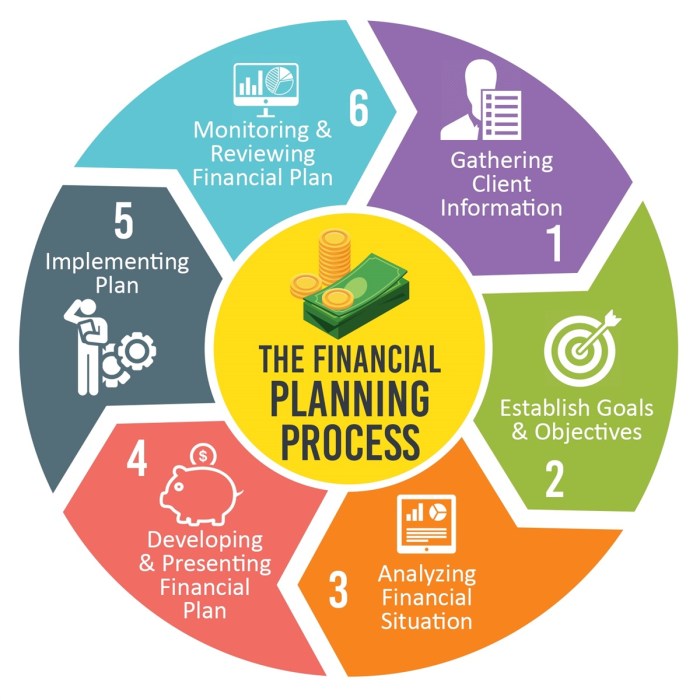As financial planning takes center stage, this opening passage beckons readers into a world crafted with good knowledge, ensuring a reading experience that is both absorbing and distinctly original.
Let’s dive into the key components and strategies of financial planning that can pave the way to a secure and stable financial future.
Importance of Financial Planning
Financial planning is crucial for individuals and families as it helps in setting clear goals, managing income effectively, and preparing for unexpected expenses. It provides a roadmap for achieving financial stability and security in the long run.
Benefits of Financial Planning
- Creating a Budget: Financial planning helps individuals track their income and expenses, allowing them to allocate funds wisely and avoid overspending.
- Building Savings: By setting aside money for emergencies, retirement, or major purchases, financial planning ensures a safety net for the future.
- Reducing Debt: With a solid financial plan, individuals can strategize debt repayment and avoid falling into a cycle of high-interest debt.
- Investing Wisely: Financial planning guides individuals on how to grow their wealth through smart investments that align with their goals and risk tolerance.
Secure Financial Future with Financial Planning
By following a well-thought-out financial plan, individuals can achieve long-term financial security. For example, saving for retirement early and consistently can lead to a comfortable retirement lifestyle without financial worries. Additionally, having an emergency fund in place can protect individuals from unforeseen events like medical emergencies or job loss.
Key Components of Financial Planning
Financial planning involves several key components that work together to help individuals achieve their financial goals and secure their financial future.
Setting Financial Goals
Setting clear and specific financial goals is crucial in financial planning. These goals serve as a roadmap to guide individuals in their financial decision-making and provide motivation to stay on track.
- Short-term goals: These are goals that can be achieved within a year or less, such as building an emergency fund or paying off credit card debt.
- Long-term goals: These are goals that require more time to achieve, such as saving for retirement or buying a home.
Income, Expenses, Savings, and Investments
Factors like income, expenses, savings, and investments play a significant role in financial planning. Understanding how these elements interact can help individuals make informed financial decisions and achieve their goals.
- Income: The money earned from various sources like salary, bonuses, or investments.
- Expenses: The money spent on necessities, bills, and discretionary items.
- Savings: Setting aside a portion of income for future needs or emergencies.
- Investments: Allocating funds into different investment vehicles to grow wealth over time.
Remember, a well-rounded financial plan considers all these components to ensure financial stability and growth.
Strategies for Effective Financial Planning
Creating a realistic budget is crucial for effective financial planning. By tracking your income and expenses, you can identify areas where you can cut back and save more money for your future financial goals.
Role of Emergency Funds and Insurance
Having an emergency fund is essential to cover unexpected expenses like medical emergencies or job loss without dipping into your savings or going into debt. Aim to have at least three to six months’ worth of living expenses saved in an easily accessible account.
Managing Debt and Improving Credit
To effectively manage debt as part of your financial plan, prioritize paying off high-interest debts first while making minimum payments on others. Consistently paying your bills on time and keeping your credit utilization low can help improve your credit score over time.
Long-Term Financial Planning

Long-term financial planning is crucial for ensuring a stable and secure financial future. It involves strategic decisions and actions taken to secure financial stability over an extended period of time, typically beyond five years.
Retirement Planning
Retirement planning is a key component of long-term financial planning. It involves setting aside funds and investments to support you during your retirement years when you are no longer earning a steady income. It is essential to start saving and investing early to build a sufficient nest egg for retirement.
Investment Strategies for Long-Term Growth
When planning for the long term, it is important to focus on investment strategies that offer growth potential over time. Long-term investments such as stocks, mutual funds, and real estate can help grow wealth steadily over the years. Diversifying your investment portfolio is also crucial to minimize risk and maximize returns.
Estate Planning for Future Generations
Estate planning is another critical aspect of long-term financial planning. It involves making arrangements for the transfer of your assets and wealth to your heirs and beneficiaries after your passing. Proper estate planning can help minimize taxes and ensure that your loved ones are financially secure for generations to come.
